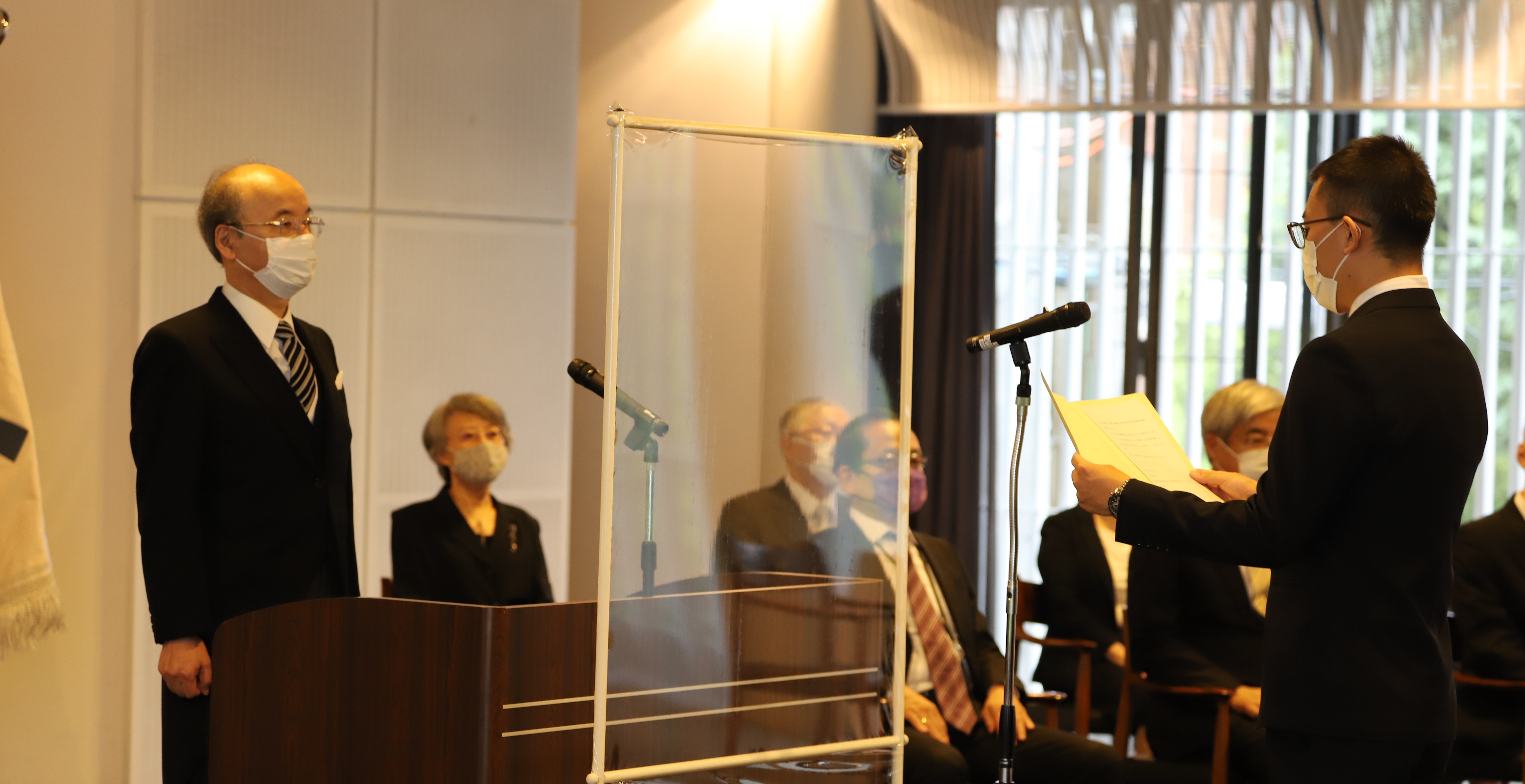Ceremonial Address for the AY2020 Autumu Graduate School of Science and Technology Entrance Pledge Ceremony

To our newly admitted students who have joined the Kyoto Institute of Technology as graduate students, and to those students who completed their master’s program here and will continue their studies at the doctoral level, congratulations on your enrollment. Today, we welcomed 14 students in master’s programs and 19 students in doctoral programs.
This year, due to COVID-19 infections, we have had to simplify the ceremony a bit while wearing masks and maintaining social distancing, but it is with great joy and pleasure that we are able to hold this entrance pledge ceremony with you today.
It has been more than 70 years since the university was founded in 1949, and about 120 years since the founding of its predecessor schools: the Kyoto Sericulture Training School, established in 1899, and the Kyoto Craft High School, established in 1902. As for our graduate schools, two graduate schools – the Graduate School of Engineering and Design, established in 1965, and the Graduate School of Textile Science, established in 1966 – were integrated in 1988 to create the Graduate School of Science and Technology, which has doctoral programs. It has been more than 30 years since the Graduate School’s formation.
Needless to say, our school is located in Kyoto. As a capital city which has been around for a millennium, Kyoto has fostered Japan’s traditional industries and its culture. Above all, it has produced many things as a source of manufacturing. With regard to that manufacturing, Kyoto has a mindset of respecting traditions, while at the same time incorporating new technologies and ideas to create new value and generate social innovation. For all of you who will lead lives as graduate students at KIT, I hope that you will make the most of the power of Kyoto in your studies and in your research.
Now, the goal of human resource development at this university is not just to develop engineers, but to develop the kind of people we call Tech Leaders. A Tech Leader is an individual who can provide leadership, based on their engineering knowledge and skills, to successfully lead a variety of social projects. In order to achieve this goal, we advocate for the following four competencies as the “KIT Competencies,” which include not only knowledge but also skills and behavior: professional skills, leadership skills, foreign language proficiency, and cultural identity.
Currently, the Graduate School of Science and Technology is developing a new advanced program that goes beyond specialized human resource development to further enhance the competency of Tech Leaders and enable them to hone their skills. It is a program which introduces design thinking in a backcast format, for students to work on practical problem-solving projects in collaboration with industry and academia. Backcasting is a style in which you set goals for what kind of society you want to create, and what you want to develop, then move forward with research and technology development. The process of extracting the goals themselves and planning methods to solve the problems is called design thinking.
Our university has already launched the “Design-centric Engineering Program” as a university-wide graduate program, as well as the “Post-Hierarchical and Interdisciplinary Integrated Value Creation Engineering Program,” which focuses on design engineering fields which take advantage of the strengths of companies in the Kyoto area. In addition, we are currently preparing a “Doctoral Human Resource Development Program through Co-Creation Education” which focuses on materials chemistry. These three programs are designed to look at the world and also contribute to local industry. The programs are designed to incorporate industry-academia cooperation and industry-academia collaboration as essential requirements, actively incorporate wisdom from across different fields, and include multifaceted creative perspectives from a variety of constituencies in collaboration with leading overseas universities. Social innovation cannot be achieved through specialized research alone. It needs collaboration across a broad range of fields. We plan to continue expanding into all areas of expertise at the university.
We also offer other opportunities such as double degree programs, international workshops, summer schools, study abroad programs at international exchange partner universities and other institutions, as well as internships at companies and other organizations, so that you can grow further as graduate students. The global pandemic of COVID-19 infections has made it difficult for all of you to take on challenges as you have done in the past. However, amidst this new way of living, I would like us to combine our wisdom to move in a more positive direction.
Even in the midst of the COVID-19 crisis, I hope that your graduate school lives will be fulfilling, that you will achieve brilliant results, and that you will experience growth. Let’s do our best, together.
And with these words, I would like to conclude my address.
September 25, 2020
President, Kyoto Institute of Science and Technology
Kiyotaka Morisako
